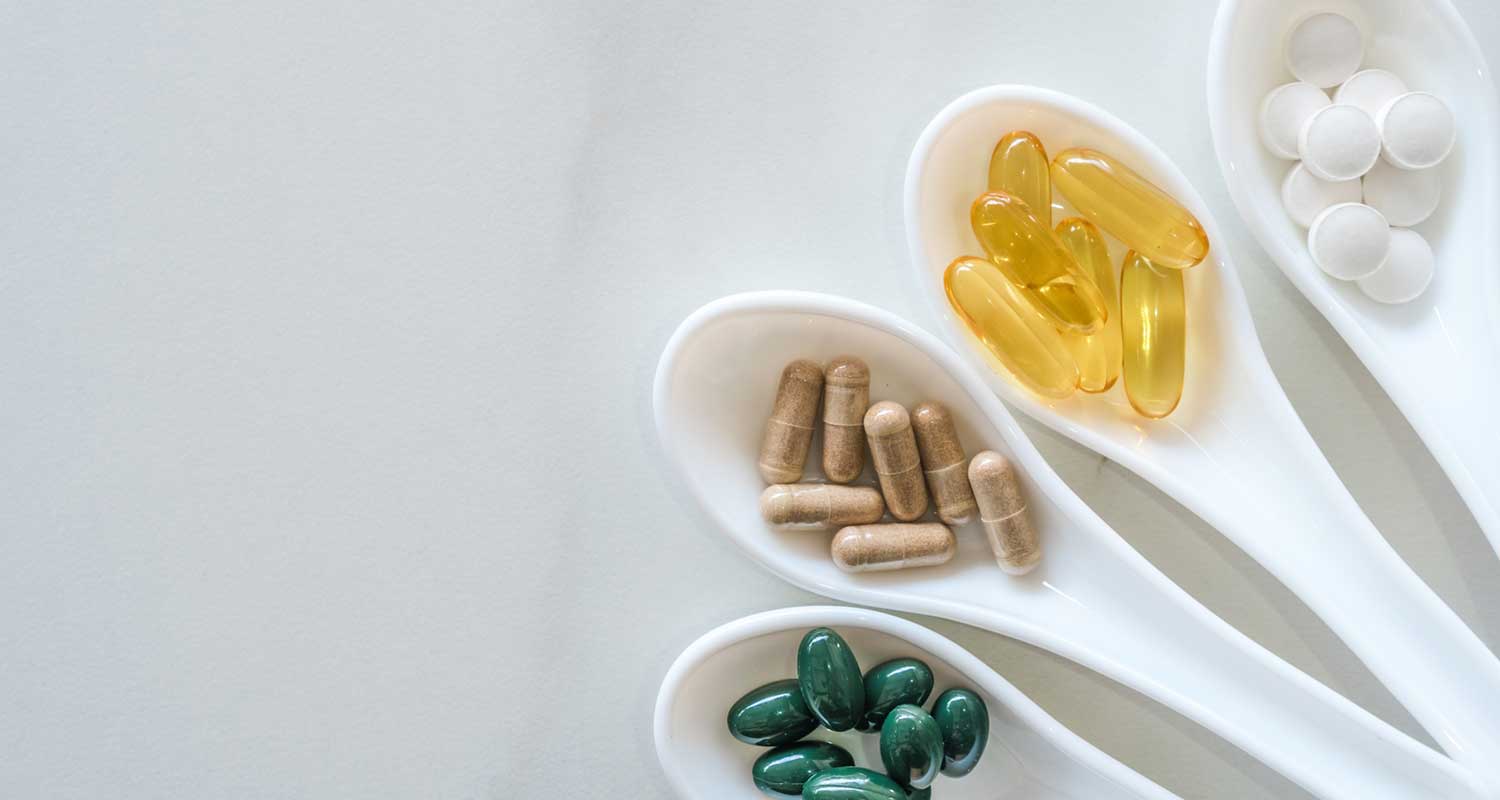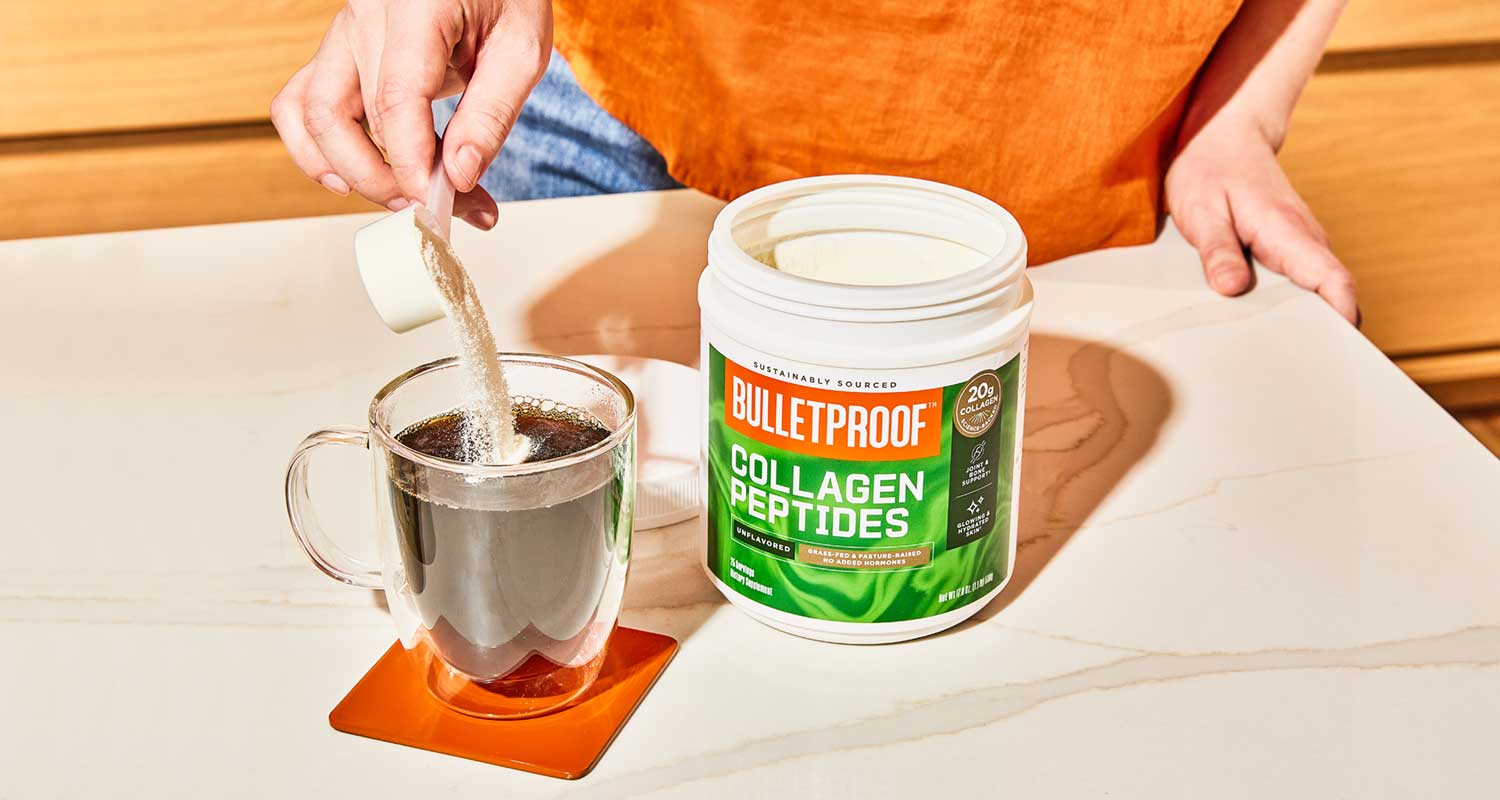What If You Could Eat Your Facial Serum? Turns Out, You Can

- Dietary supplements like collagen, antioxidants and essential vitamins help maintain hydration, elasticity and resilience.
- A well-timed supplement routine targets skin health throughout the day, with hydration in the morning, defense in the afternoon and renewal at night.
- Collagen is essential for skin support, but combining it with omega-3s, zinc, glutathione and sleep-supporting supplements enhances long-term skin health and radiance.
Your skin is a reflection of what’s happening inside your body. While topical products help, true skin support starts with the right nutrients. Supplements provide essential building blocks for a healthy, glowing complexion, working beneath the surface to support hydration, elasticity and resilience.
Supplements for Skin Health
Collagen, antioxidants and vitamins play a crucial role in skin health. They can help to support firmness, maintain moisture and defend against environmental stressors. But your skin’s needs change throughout the seasons, making it important to stay aware and adapt your routine accordingly. Winter skincare, for example, often requires extra hydration and barrier support, while summer calls for antioxidant protection because of increased sun exposure.
Understanding the difference between ingestible and topical skincare can help you make the best choices for lasting skin support year-round.

Ingestible Vs. Topical Skincare
Topical skincare works on the surface, while dietary supplements support your skin from within. Both play a role in skin health but work in different ways. Serums and moisturizers help hydrate, protect the skin barrier and address visible concerns like dryness or fine lines.[1] Meanwhile, ingestible beauty supplements deliver nutrients through your bloodstream to nourish skin at the cellular level.
While a mindful diet can provide food for skin health, supplements offer a concentrated dose of key ingredients to help support elasticity, hydration and resilience. Since skin constantly regenerates, combining topical care with internal nutrition can lead to long-term, visible benefits.
Beyond Collagen
While collagen is a powerhouse for skin support other nutrients play a crucial role in maintaining a healthy, radiant complexion. Here are some key supplements that work alongside collagen to support your skin:
Glutathione and Antioxidants
Glutathione a master antioxidant, helps defend against oxidative stress that can accelerate skin aging.[2] It also plays a role in maintaining an even skin tone by supporting the body’s natural defense against environmental damage.
Zinc with Copper
Zinc supports skin health and healing, while copper helps to keep mineral balance and support collagen production.[3][4] Taking them together ensures optimal skin benefits without nutrient imbalance.[5]
Astaxanthin
This powerful carotenoid helps protect skin from UV damage by helping to inhibit oxidative stress. It also supports hydration and elasticity, helping to maintain a healthier complexion.
Omega-3s
Omega-3 fatty acids may help maintain skin hydration by supporting the skin barrier function and hydration.[6] They also help keep skin looking healthy and nourished by providing essential fats that support overall skin function.[7]
Sleep-Supporting Supplements
Quality sleep is essential for skin repair, as it’s when the body produces collagen and regenerates skin cells.[8][9] Sleep-supporting supplements help promote restful sleep, allowing your skin to recover overnight for a refreshed, healthy glow.
Vitamins A, C, D, E, and K
These essential vitamins work together to support skin health by promoting collagen production, hydration and protection against environmental stressors. Vitamin A aids in cell turnover,[10] Vitamin C supports collagen synthesis,[11] Vitamins D[12] and E[13] help maintain the skin barrier and Vitamin K plays a role in reducing the appearance of dark circles and uneven skin tone.[14]
Incorporating these supplements into your routine can enhance your skin’s health and appearance, working in synergy with collagen for the best results.
Collagen as Skincare
Collagen plays a vital role in keeping skin firm, smooth and hydrated. It’s the most abundant protein in the body, providing structure to the skin, hair, nails, and connective tissues. However, collagen production naturally declines with age, leading to visible signs of aging like fine lines, wrinkles and loss of elasticity.[15] Supplementing with collagen helps support skin health from within, promoting hydration, resilience and a youthful appearance.[16]

How Collagen Supports Skin
Collagen acts as the skin’s structural foundation, helping it stay firm, smooth and resilient. As a key protein in the skin, it provides support and elasticity, but natural collagen production declines with age. Supplementing with hydrolyzed collagen peptides can help replenish these levels, as they are broken down into smaller amino acids that the body can easily absorb and use for skin health.
One of collagen’s primary benefits is maintaining skin elasticity, which helps with the appearance of fine lines and wrinkles.[17] It also plays a crucial role in hydration by supporting the skin’s ability to retain moisture, thereby inhibiting dryness and dullness.[18] As if that weren’t enough, collagen contributes to skin repair by strengthening the skin barrier and promoting recovery from environmental stressors.
However, not all collagen supplements offer the same benefits. The type and source of collagen affect how well the body absorbs and utilizes it for skin health.
Choosing the Best Type of Collagen for Skin
Collagen is the most abundant protein in the body, with 28 different types playing a role in various tissues. However, most collagen supplements focus on five key types, with Type I and Type III being the most beneficial for skin health. Some of the best options for supplementation include hydrolyzed collagen peptides, marine collagen, and bovine collagen.
Hydrolyzed Collagen Peptides
Also called collagen peptides, this form is broken down into smaller amino acids for better absorption. It easily dissolves in coffee, smoothies, and other beverages.
Marine Collagen
Sourced from fish, marine collagen is rich in Type I and Type III collagen and has a smaller molecular size, making it highly bioavailable.[19]
Bovine Collagen
Derived from grass-fed cows, bovine collagen contains both Type I and Type III collagen, making it an excellent all-around option for skin support.[20]
To get the most out of your beauty routine, it’s important to time your supplements strategically throughout the day. Here’s how to structure your daily supplement schedule for optimal skin health.
Supporting your skin from within is simple when you build supplements into your daily routine. Here’s how to maximize their benefits from morning to night.

Morning: Hydration and Protection
Start your day with supplements that nourish your skin from within. Add collagen to your coffee or morning smoothie to support your skin’s elasticity. If you want to go a step further, pair it with vitamin C to promote collagen synthesis. Then, supplement with Omega-3 fatty acids to help maintain skin hydration, and astaxanthin and vitamin E to provide antioxidant protection against daily stressors.
Afternoon: Defense and Recovery
Midday is the perfect time to reinforce your skin’s defenses and aid recovery. Start with a glutathione supplement on an empty stomach or between meals for optimal absorption. This powerful antioxidant can even your skin tone by enhancing your body’s natural defense against environmental stressors.
Take vitamin A with a small snack to support healthy cell turnover, helping your skin stay smooth and refreshed. Time your vitamin D with a meal containing healthy fats to boost absorption and strengthen your skin barrier. For best results, take glutathione separately from vitamin A and D, which absorb better with food.
Take zinc and copper together with your mid-afternoon snack to support skin healing and collagen production. Since these minerals compete for absorption, pairing them, at just the right amounts, ensures proper balance and prevents deficiencies.
Evening: Renewal and Repair
Support your skin’s overnight recovery by timing your supplements for maximum benefit. About 30–60 minutes before bed, take sleep-supporting supplements like magnesium or L-theanine to help you relax and promote restful sleep. Once you’re winding down, mix collagen peptides into a warm beverage like herbal tea or bone broth. This provides your body with essential amino acids to replenish skin while you sleep, supporting collagen production and overnight repair.
By incorporating these supplements into your daily routine, you can nourish your skin while supporting overall wellness. Consistency is key. With the right approach, you’ll not only see the benefits but feel them, too. A simple daily habit can lead to long-term skin health and a natural, confident glow.
Sign up for early access to sales, product launches, the latest Bulletproof news and more!



